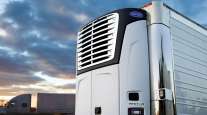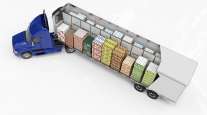E&MU: Plug-In Power Cools Cargo, Helps Shippers Go ‘Green’
By Eric Brothers, Contributing Writer
Special to E&MU
This story appears in the May/June 2010 issue of Equipment & Maintenance Update, a supplement to the May 17 print edition of Transport Topics. Click here to subscribe today.
The need for total control of the “cold chain” — every point in a refrigerated shipment’s environment — is driving demand for more efficient ways of maintaining cargo temperature during the transfer of goods between dock and trailer.
Dock seals that leak, ever-larger dock spaces and, in no small part, California’s continued assault on diesel emissions, are invigorating the adoption of electrical shore power for refrigerated trailers.
“Since the doors of the trailer are open, the TRU [trailer refrigeration unit] winds up trying to help cool the entire dock instead of just the interior trailer space,” said David Kiefer, director of marketing and product management for Carrier Transicold, Syracuse, N.Y. “The TRU is generally running highly loaded and at high speed, which means it is potentially at its loudest and consuming diesel fuel at a high rate.”
Electrical power provides the benefits of holding cargo temperatures steady at the dock and helping reefer carriers while enabling their warehouse customers to “green” up their operations.
“Not only is the TRU much quieter on electric power with the [reefer’s] diesel engine shut off, but operating savings of approximately 40% to 70% can be achieved due to the lower cost of electric power versus diesel operation,” Kiefer said.
Sales of shore-power-capable TRUs are up 400% over the past few years, said Thomas Kampf, Thermo King Corp.’s trailer product manager for North America. Though still small overall, the segment is growing exponentially, he said.
In addition to the fuel savings electric standby offers, it also complies with diesel emissions rules that have taken effect in California and that other states are contemplating.
California requires reduction in emissions from the small diesel engines that for so long have provided refrigeration power for road and rail shipping. Options are diesel particulate retrofits, replacement of older equipment with low-emissions products, and shutting off the unit’s engine and plugging it into the electrical grid.
Tim Minor, Thermo King’s national account manager, said, “Legislation is a game-changer that can require customers to respond quickly in the way they operate.”
Minor also cites a growing customer focus on measurably reducing environmental effects.
Fresh Express Inc., a subsidiary of Chiquita Brands and known for its ready-to-eat packaged salads, installed electrical hookups at its loading docks in Salinas, Calif.
Its carrier partner, Brent Redmond Transportation, Hollister, Calif., uses the power hookups to run its trailer units with Thermo King’s SmartPower electric standby option instead of running the units’ diesel engines.
Since starting the program in January with six hookups, Fresh Express has prevented the release of at least 77 pounds of carbon into the atmosphere each day, said Thomas Shepherd, vice president of transportation for Fresh Express.
Moreover, he added, it costs 25% to 30% less to pre-cool the trailer with electricity than with diesel power.
Fresh Express estimates emissions reduction from the project when fully implemented could be as much as 30,000 pounds of carbon dioxide in a year — in addition to other benefits of the electrical approach to trailer refrigeration: less noise, longer TRU life span, reduced maintenance and overall lower life-cycle costs.
Brent Redmond Transportation runs Thermo King’s SB-210+ units with its SmartPower electric-standby connections.
Carrier Transicold, which splits the trailer refrigeration market with Thermo King, offers an all-electric unit under the Vector label that the company said not only provides about the same performance on electric standby as it does in diesel operation, but it also is designed around a hybrid diesel-electric power system for on-road use.
Carrier’s most advanced on-board technology is a 2.2-liter diesel engine driving an electric generator, which powers the refrigerator compressor’s electric motor. This motor eliminates the conventional belt drive between engine and compressor, which Carrier said reduces maintenance requirements.
Carrier introduced its “hybrid” system in 2005.
Witte Bros. Exchange Inc. hauls less-than-truckload frozen, processed and refrigerated foods throughout the United States and recently invested in a 460-volt, three-phase AC-power infrastructure at the company’s Troy, Mo., terminal to support shore-power operation of 50 trailers.
Brent Witte, president of Witte Bros., said the fleet operates Carrier’s Vector hybrids with integrated electric standby. With the trailers at the terminal two or three days a week, he said, he expects a reasonable payback period, despite the costs of the equipment.
Witte plans to replace all of his TRUs with electric standby models because he believes it
is a good tool to show customers that they are minimizing their carbon footprints by using his company.
He also said he likes that the hybrids have fewer moving parts. His regular TRUs last five years, and he hopes the hybrids will extend that life cycle to seven to 10 years before trade.
“We’re always looking for a good cost-effective use of technology and efficiency,” Witte said. “In trucking, the only way you’re going to survive is to find your efficiencies.”




